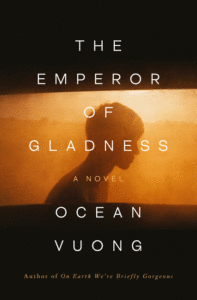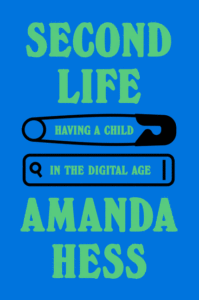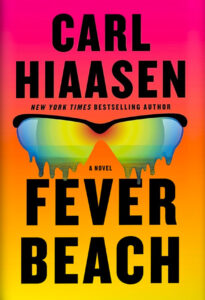
Our quintet of quality reviews this week includes Andrea Long Chu on Ocean Vuong’s The Emperor of Gladness, Joanna Scutts on Amanda Hess’ Second Life, Dustin Illingworth on Mathias Énard’s The Deserters, Sarah Crown on Eric Puchner’s Dream State, and Ron Charles on Carl Hiassen’s Fever Beach.
Brought to you by Book Marks, Lit Hub’s home for book reviews.
*

“What a pleasure to be given characters and a plot! Emperor feels at every turn like the book On Earth should have been, if only Vuong had seen prose as an opportunity instead of an obstacle to be sandblasted away by pure force of lyricism. The author finally seems to have accepted that prose, unlike poetry, will wither and die without a reader who can actually understand it: At last, he is talking to us. Vuong says he first turned to poetry because it provided ‘the pressure of the hand on the skin,’ a kind of nonlanguage that could express, through its aura of inscrutability, the poet’s very real experience of being misunderstood. But he has so often been crushed by the weight of his own particularity that he has forgotten—or, worse, denied—that even gay Vietnamese immigrants are capable of universal experiences. Vuong is now one of the most famous poets in America; his veil of illegibility is a choice, not an artifact of empire.
That is the peril faced by every marginalized writer: He may become so accustomed to the margins he cannot recognize the center even when he is standing in it. But it is easier for the diasporic poet to loudly assert that the motherland is unknowable than to admit he happens not to know very much about it. I am reminded of one of Vuong’s stated influences, Virginia Woolf’s To the Lighthouse: ‘It seemed to her such nonsense—inventing differences, when people, heaven knows, were different enough without that.’ I do not mean to imply that Vuong must give up those things that make him different. But to write prose—as I think The Emperor of Gladness shows—is to assume that these differences, however personally painful or politically fraught, do not prevent the writer from having at minimum one thing in common with his readers: namely, language itself.”
–Andrea Long Chu on Ocean Vuong’s The Emperor of Gladness (Vulture)

“The story of pregnancy, birth, and new parenthood follows a preordained, overarching plot—ignorance to knowledge, innocence to experience—but its contours are as variable as the curves of a pregnant body or an individual digital footprint. As a longtime reporter on internet culture for The New York Times and elsewhere, Amanda Hess excels at connecting our private online encounters to wider cultural shifts. In her debut memoir of ‘having a child in the digital age,’ she skewers the fluttering trends and quirks of the internet with the gentle ruthlessness of a lepidopterist, whether she’s describing the TikTok spectacle of tradwives in kitchens ‘as white as a near-death experience,’ or escaping angry Reddit forums to ride the ‘pastel carousels’ of Instagram. What quickly emerges from her tale is how atomized our digital lives have become, how splintered our shared reality.
…
“Hess’s own critique of this technology is somewhat muted, and her acquiescence to it wryly relatable. Told not to google a worrying diagnosis or seek out the underbelly of unvetted Facebook groups, she immediately dives into the abyss. Rather than yearning for some lost Eden of unmediated parenting, Hess accepts that we are all, now, dwellers in ‘the digital age,’ and she navigates that landscape with humor and nuance. Implicit in her story is the powerful, discomfiting argument that if we want to counter the excesses of this technology, we must first be honest about our dependence on it.
…
“It could have been easy to dunk on the dystopia of it all, but Hess avoids that easy path, staying in the muddled middle where most of us live. ‘All I wanted to post was baby,’ she admits, but nothing will make you realize the radical gulf between the internet and real life like baby. At the end of the book, Hess visits a costly women’s empowerment retreat, the IRL manifestation of an online freebirthing community, where, in short order, she encounters a virulent transphobe and a quack doctor touting cures rooted (surprise surprise) in antisemitic conspiracies. The experience is jarring and clarifying. The ‘nonsense’ that the doctor spouts when Hess asks about her son’s genetic condition is so glaring that it lights up a truth: Her child is a person, irreducible to the algorithm. Yawning behind the confidence of real and fake doctors, machines and message boards, is the uncertainty, vast and existential, of this baby’s particular body and his particular life. And there is ultimately no other way to parent, in any age and circumstance, than by sailing right off into it.”
–Joanna Scutts on Amanda Hess’s Second Life: Having a Child in the Digital Age (The New Republic)

“Mathias Énard’s latest novel, The Deserters, conjures its layered melancholy from a pair of interwoven narratives. The first explores the probable suicide of Paul Heudeber, an East German mathematician and Buchenwald survivor, as recounted by his now elderly daughter, Irina. The second follows the perilous desertion of a soldier in a nameless contemporary war.
Utterly distinct in form and tone, these braided stories demand a certain vigilance from the reader, an alertness to echo and intuition. Recalling the twinned prime numbers in one of Heudeber’s theorems, rhyming catastrophes in each account give shape to both history and the more inscrutable intervals of an individual life.
…
“There is a Job-like quality to the novel’s preoccupations, a crying out in a wilderness of pain and confusion. If there is any consolation in our shared perdition, it remains so distant as to be inscrutable: ‘I sometimes feel as if all of this is connected, obscurely,’ one of Heudeber’s colleagues remarks, ‘that we’re all connected to each other like a series of numbers, even though we don’t really understand how.’ History itself comes to seem an impenetrable formula, a theorem awaiting its impossible proof.
In this artful and sad novel, forbearance is courage. The donkey—Énard’s quiet, Bressonian hero—endures its suffering with a moving stoicism. Refusing to desert its companions, it abides trials and privations in one ordeal after another. In the fallen world of The Deserters, this persistence is indistinguishable from grace.”
–Dustin Illingworth on Mathias Énard’s The Deserters (The New York Times Book Review)

“By following his characters over the course of years, Puchner shows us that we’re not fixed at the point of early adulthood; that change remains not just possible but inevitable. Yet in revealing how profoundly the children’s lives are shaped by the actions of their parents, he simultaneously calls the whole idea of free will into question.
And free will means something different for those born in the 21st century. In its scope and plenitude, Dream State feels, at times, like a Victorian novel: an unhurried depiction of a rich, full world, in which actions have consequences that ripple across generations. But where the great novelists of the Victorian age tended to set their players’ foibles and insecurities against stable, knowable landscapes, these characters’ journeys take place amid a landscape that is slipping and changing, year by year, degree by terrifying degree. Puchner measures the passage of time by the disappearance of wildlife, the recession of the snowline and, most poignantly, by the retreat of the lake from the shore, leaving behind a ‘dry lake bottom … bleached grey as the moon.’
…
“In his wrenching final chapter, Puchner takes us back to the beginning, and shows us the events that set his central characters’ feet on the path to their endings. We feel, in an instant, both the loss of the promise their own lives contained and the collective loss of a steadily unfolding future that once we took for granted. In Dream State, Puchner seduces us with a familiar and deeply secure narrative structure, only to undermine that structure, to force it to tell a tale of profound and fatal insecurity. But he tells his tale so compellingly, so engagingly, with such warmth and humor, that it’s not until you set the book down that you can appreciate the breadth and brilliance of what he’s done.”
–Sarah Crown on Eric Puchner’s Dream State (The Guardian)

“By my tally, there are enough self-pleasuring jokes in this novel to make a 15-year-old boy go blind. And even in the pantheon of Hiaasen’s freakish villains, Figgo stands out as a particularly grotesque pustule on the body politic.
…
“Admittedly, Fever Beach feels about 100 pages too long—the cardinal flaw in most comic novels. But the real question remains: Is it funny? And in this case, should we be laughing? How many times have we been solemnly admonished to strive toward understanding the culty racists festering on the edge of the Republican Party? Are red-white-and-blue charlatans suitable subjects for comedy in light of our country’s slide toward fascism—the unraveling of environmental protections, the sabotage of science and medicine, the attacks on election integrity, the tirades against immigrants ‘poisoning the blood’ of America?
Yes. Without in any way diminishing the seriousness of the threats we’re facing or the difficulty of restoring moral and political order to the United States, humor remains a powerful weapon to pierce the armor of tyrants and raise the spirits of patriots. For all his silliness, Hiaasen is working in a grand tradition that stretches back to Mikhail Bulgakov satirizing Stalinism and Charlie Chaplin mocking Hitler. At his best, he can pack a paragraph with so many little parodic bangs that it feels like a fireworks display, when the explosions come so fast you stop saying “Ahhh” and just stand in slack-jawed bedazzlement.
While white-shoe lawyers, university presidents and media moguls cower before the MAGA assaults on American democracy and decency, this mischievous 72-year-old writer is fighting back with every political gag and sex joke he can get his hands on.”
–Ron Charles on Carl Hiassen’s Fever Beach (The Washington Post)


























